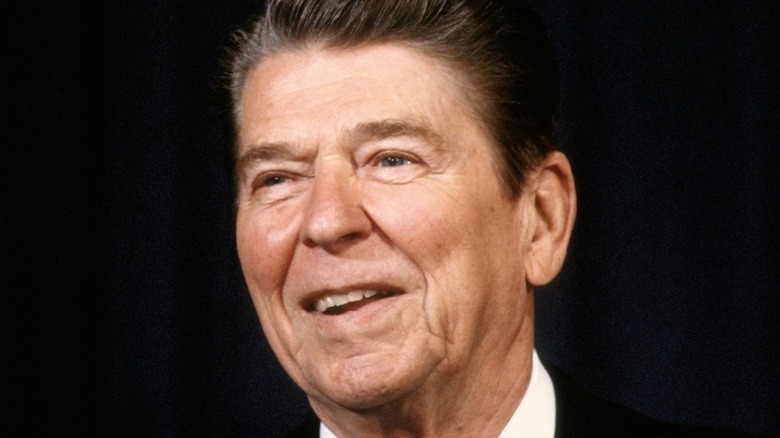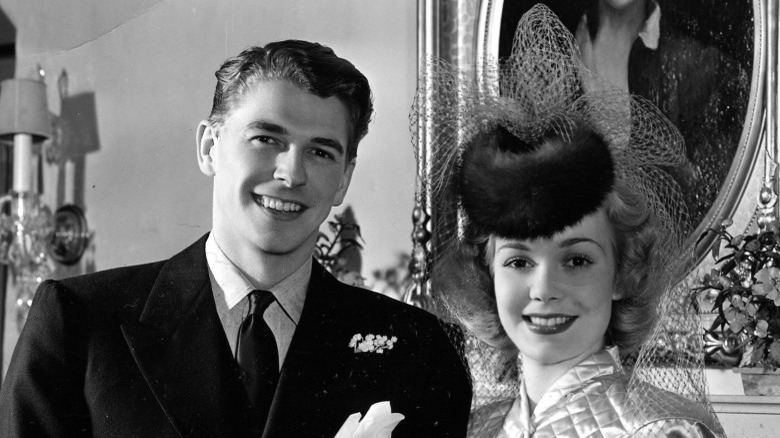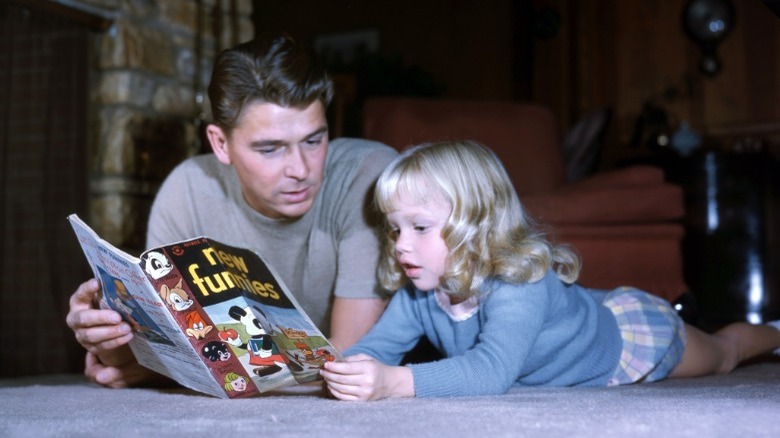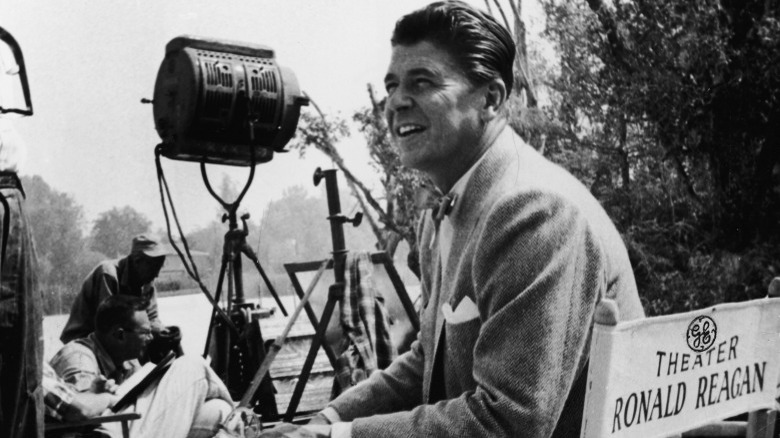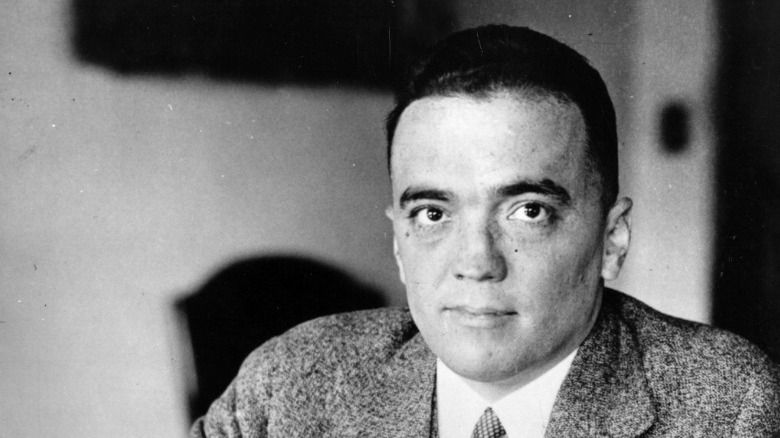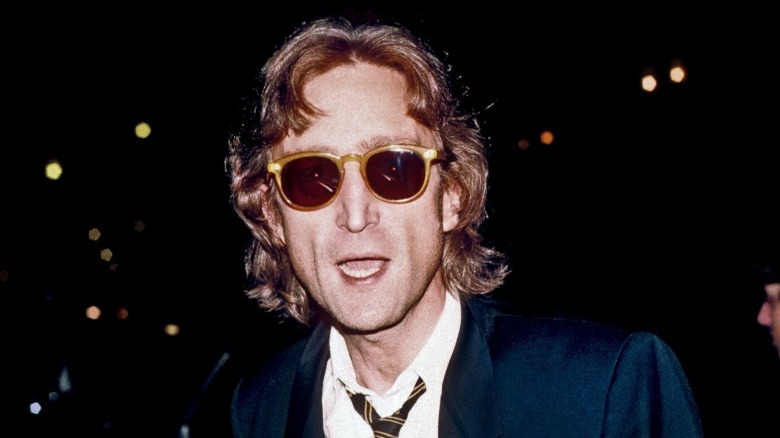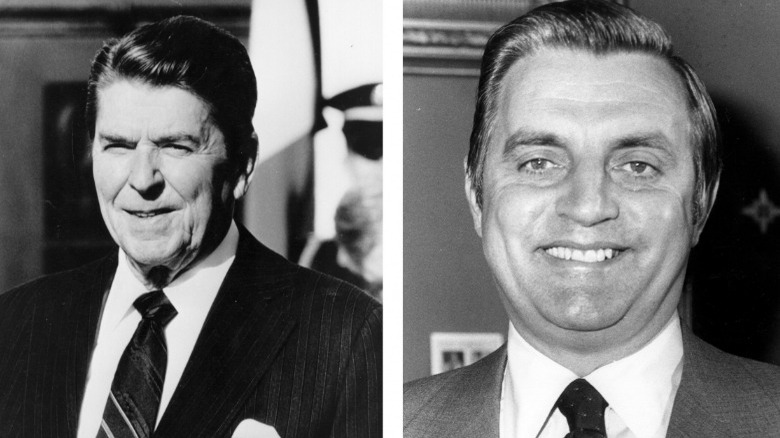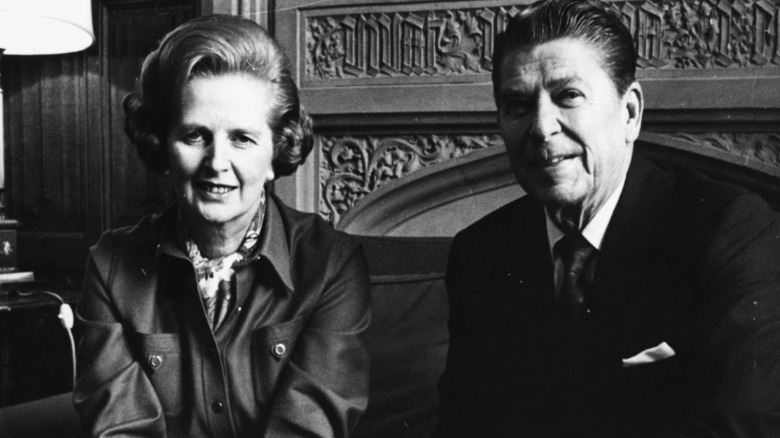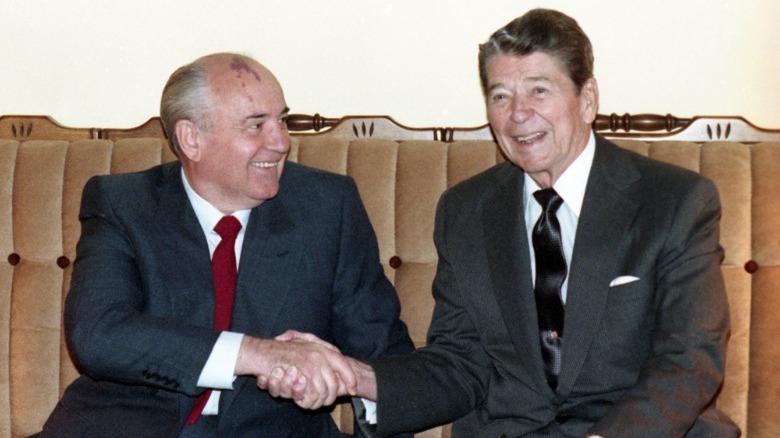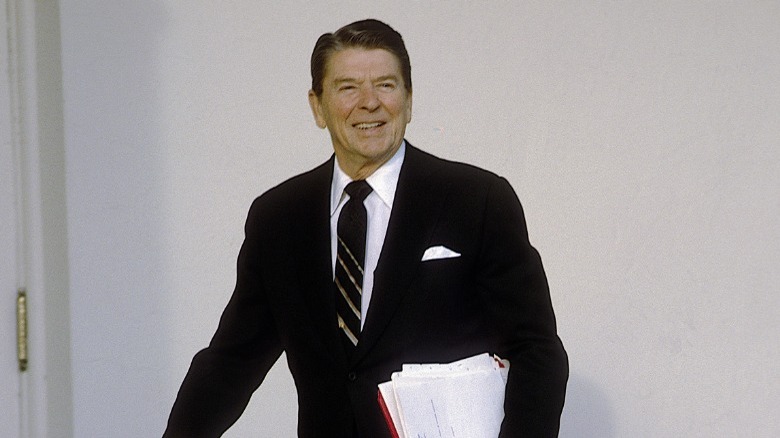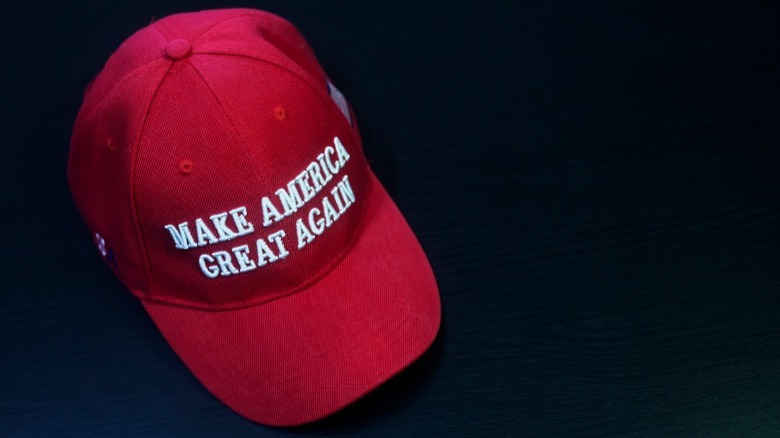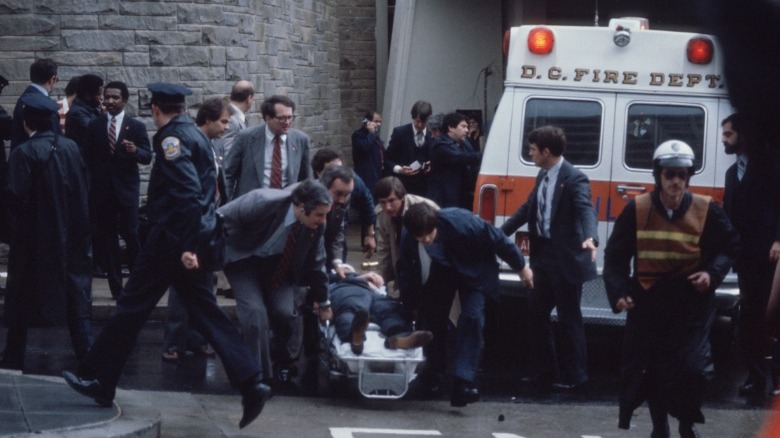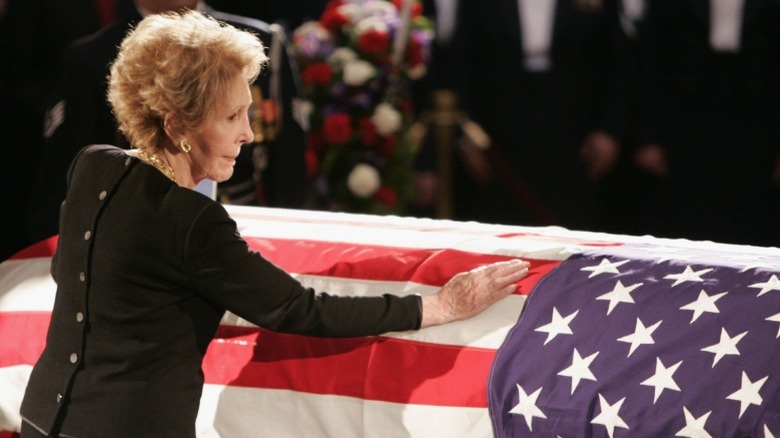The Untold Truth Of Ronald Reagan
Ronald Reagan was the 40th president of the United States, serving from 1981 until 1989. A former Hollywood actor, the Illinois native appeared in dozens of films and TV shows through the '30s, '40s, '50s, and early 1960s. When he wasn't playing a district attorney in "Storm Warning" or a crusading marshall in "Law and Order" (not that one), Reagan was displaying his nascent leadership skills as head of the Screen Actor's Guild (via UPI).
Reagan's presidency was among the most important in American history. In the spring of 1989, the Hoover Institution's Burton Yale Pines wrote that the "Reagan Revolution" had, "transformed America as significantly as have two previous presidential revolutions: the political revolution of Andrew Jackson in the 1830s and that of Franklin Roosevelt in the 1930s." This generous assessment was echoed by a majority of Americans. Reagan left office with an approval rating of 63%, the highest departure rating in history (via ThoughtCo). Twenty-two years later, in 2011, Gallup announced that Americans were most likely to say Reagan was the nation's greatest president.
However, while many know about "Reaganomics" and the president's easy charm, less is known about Reagan's divorce, his family life, and a reputation that went from Hollywood lightweight to an icon of American history. Here are some of the curiosities and contradictions of President Ronald Reagan.
Ronald Reagan went through a bitter divorce
Ronald Reagan married actor Jane Wyman in 1940. The pair met in 1938 on the set of the comedy "Brother Rat." Wyman was twice divorced by the age of 21, but the young actress was, "smitten with [Reagan] at first glance," according to their adopted son Michael. Indeed, Wyman went to drastic lengths to secure Reagan's hand in marriage. According to biographer Bob Spitz, after months of Reagan putting off the union, Wyman was hospitalized after harming herself. Reagan agreed to marry her.
The cracks in this already toxic union would soon appear. Wyman was reportedly "infuriated" by Reagan's "incessant chatter" and mocked him as having "diarrhea of the mouth." She was frustrated also by his ambition, which she perceived as distracting him from their marriage. Furthermore, he was envious in 1948 when Wyman won the Oscar for Best Actress in "Johnny Belinda." It then transpired that Wyman had a fling with her "Johnny Belinda" co-star Lew Ayres (via Reference).
Magnanimously, Reagan announced that he would accept the affair and move on. However, later in 1948, Wyman filed for divorce, citing "mental cruelty." Described by National Affairs as an unfair accusation, Reagan would channel this experience into overturning the laws of "fault-based divorce." In 1969, as governor of California, Reagan signed the nation's first no-fault divorce bill, which eliminated the need for spouses to have a reason for divorce. Now, Californians could divorce at will, and the bill was swiftly emulated by states across the union. Reagan would later describe the bill as one of the biggest mistakes of his political life.
Reagan was an 'emotionally distant' father
According to the Miller Center, Ronald Reagan was an emotionally distant person. His wife Nancy said, "There's a wall around him. He lets me come closer than anyone else, but there are times when even I feel that barrier." Reagan's emotional distance was evident in his youth. Despite being a gregarious student who played football, captained the swimming team, acted in theater productions, and presided over the student council, biographer Bob Spitz said he had "no close friends" (via Biography). Spitz suggested that Reagan's barrier was a legacy of his father, whose charming demeanor hid his womanizing and alcoholism.
Ronald Reagan's most contentious relationship was with his daughter Patricia, better known as Patti Davis (her mother's maiden name). In an interview with The Daily Beast, Patti spoke of her "many, many years of drug abuse," adding that she was "a drug addict from the time I was 15 well into my 20s." Of course, this was very much at odds with her father's "War on Drugs" or her mother's famous "Just Say No" campaign.
Patti seems to have channeled her negative familial energy into "Home Front," her debut novel. Davis tells the story of an ambitious politician who, like her father, becomes governor of California and then president of the United States. The fictional president and his first lady have a very close relationship, one that becomes isolated from their children, whom they begin to view as political liabilities.
Ronald Reagan started his political life as a Democrat
According to presidential historian Mike Purdy, Ronald Reagan "idolized" Franklin Delano Roosevelt and was a Democrat voter for much of his Hollywood career in the 1930s, '40s, and '50s. However, after his leadership of the Screen Actors Guild and the actor's union, during which he experienced physical bullying from labor unions, Reagan joined the Republican Party in the early 1960s.
Another formative experience occurred when he became a host for "General Electric Theater," a weekly prime time television series on CBS (via Biography). As part of the job, he also served as a General Electric spokesman, which further polished his eloquence as he espoused the company's pro-business philosophy.
As president, Reagan would often joke about his past life as a Democrat. In 1982, reporter Sam Donaldson asked, "You have blamed mistakes of the past and you have blamed the Congress, does any of the blame belong to you?," to which Reagan replied, "Yes because for many years I was a Democrat."
Reagan used the FBI's services during his early political career
When Ronald Reagan addressed the issue of recession during his inaugural speech in 1981, the new president said, "In this present crisis, government is not the solution to our problem; government is the problem" (via Fact Myth). Twenty years prior, in 1961, Reagan also said that big government could become "a Big Brother to us all," invoking the ominous figurehead of "Nineteen Eighty-Four." However, according to the New York Times, Reagan was not above using the services of the FBI and cultivating a personal relationship with J. Edgar Hoover, who led the bureau from 1924 to 1972.
During the Red Scare of the 1940s and '50s, Reagan collaborated with the FBI during their investigations of Hollywood's communist influences, prompting the actor to write, "I must confess they opened my eyes to a good many things." Despite this, biographer Bob Spitz noted that when testifying before the House Un-American Activities Committee, Reagan did not name any suspects and said many accusations were "hearsay."
In 1960, Reagan would use the FBI for more personal matters. George Murphy, a good friend of Reagan and his ex-wife Jane Wyman, contacted the bureau about their 19-year-old daughter Maureen, who had moved to Washington to live with a married policeman. After a clandestine investigation, the FBI confirmed Maureen's situation to Murphy, who relayed the news to Reagan and Wyman. Maureen would eventually marry the officer, but he proved to be violent. They divorced in 1962.
Reagan enjoyed a Monday Night Football game with John Lennon
According to the famed NFL sportscaster Frank Gifford, then-Governor Ronald Reagan and John Lennon met at a Monday Night Football game back in 1974. They apparently had a "great time" as Reagan explained the rules of American football to Lennon. It was not only a meeting between two historic personalities, but it was also a meeting of antithetical beliefs, or so many would think.
In a Playboy interview, Lennon described himself as an "instinctive socialist," adding, "I think people should get their false teeth and their health looked after, all the rest of it." However, despite the lyrics to his song "Imagine," namely the line "imagine no possessions," Lennon also told Playboy that he "worked for money and wanted to be rich."
He was also turned off by dogmatic counterculturalists such as Jerry Rubin and Abbie Hoffman, according to the Daily Beast. He said, "If you want to save Peru, go save Peru. Don't expect Carter or Reagan or John Lennon or Yoko Ono or Bob Dylan or Jesus Christ to come and do it for you. You have to do it yourself." In this example, Lennon was advocating the individual rather than the collective, something that would have resonated with Governor Reagan. Years later, Lennon's former assistant Frank Seaman stirred the pot when he claimed that the late singer was a secret Republican. "John made it very clear," Seaman said, "that if he were an American he would vote for Reagan because he was really sour on Jimmy Carter" (via CBS News).
In 1984, Ronald Reagan won the most electoral votes in U.S. history
In 1980, Ronald Reagan's rival was Jimmy Carter, a president overwhelmed by the Iran hostage crisis, unemployment, inflation, and intermittent energy woes. This climate of peril and malaise led to an approval rating of just 34% in December 1980, ranking Carter alongside George W. Bush, Donald Trump, and Richard Nixon as the most unpopular departing presidents (via American Presidency Project).
With a historically weak opponent, Reagan won in a landslide, securing 489 electoral votes and 44 states, according to ThoughtCo. It was among the largest margins of victory in American history, yet Reagan would prove even more dominant four years later. He entered the November 1984 election with an approval rating of 58%, and although Reagan flopped during the first debate with rival Watler Mondale, the president bolstered his popularity at the second debate by using his signature wit (via Gallup/Slate).
When the moderator pressed Reagan on his age – he was 73 – the president replied, "I will not make age an issue of this campaign. I am not going to exploit, for political purposes, my opponent's youth and inexperience." Remembered as one of Reagan's most enduring quips, the president would crush Mondale and the Democrats, winning 525 of the 538 electoral votes, the largest number in presidential history. However, it was not America's most lopsided election. That was achieved by Franklin Roosevelt, who won 98.5% of the electoral college, just 0.9% more than Regan's 97.6% landslide.
Ronald Reagan had a warm relationship with Margaret Thatcher
Margaret Thatcher served as prime minister of the United Kingdom from 1979 until 1990, meaning she worked with presidents Jimmy Carter, Ronald Reagan, and George H. W. Bush. Of those leaders, Thatcher's relationship with Reagan was closest, and it wasn't just because his presidency coincided with the bulk of her premiership. Indeed, an aide described President Ronald Reagan and Prime Minister Margaret Thatcher as "political soulmates," according to CNN. Historian Julian Zelizer added that Thatcher, "Liked Reagan a lot from the moment he won office and he felt the same ... They had a deep respect, admiration, and a friendship."
Widely compatible, the leaders saw eye-to-eye on free markets, deregulation, foreign policy, and the "special relationship." However, they had their disagreements. On October 25, 1983, the United States invaded Grenada, a Caribbean nation that was and still is a member of the Commonwealth of Nations, a "family" of peoples (mostly former colonies) associated with the United Kingdom. Reagan ordered the invasion after Bernard Coard, a Marxist revolutionary, assassinated Prime Minister Maurice Bishop, sowing chaos through the nation and threatening the U.S. population there, which comprised around 1,000 students (via History).
According to Thatcher's press secretary Martin Ingham, the prime minister said, "How could (Reagan) do it without telling me so that I could inform the head of the Commonwealth?" Keenly aware of these sensitivities, Reagan telephoned Thatcher and apologized profusely for any embarrassment he had caused to the PM.
Ronald Reagan and Mikhail Gorbachev had a genuine friendship
On March 8, 1983, President Ronald Reagan delivered his "Evil Empire" speech, which became one of his most enduring addresses. He described communism as "the focus of evil in the modern world," which signaled renewed resistance toward the Soviet Union. Later, on June 12, 1987, Reagan delivered his Berlin Wall speech, in which he challenged Soviet Premier Mikhail Gorbachev to "tear down this wall!"
However, despite the optics of Reagan's hawkish stance against the Soviet Union, Reagan and Gorbachev shared both respect and friendship. According to History, their relationship was developed through 40 letters and four summits, including the Reykjavik summit of 1986. At the time, Reykjavik was considered a failure by both the U.S. and the USSR, yet according to the University of Sheffield, the meeting would become a "keystone" of Cold War diplomacy that preceded the Intermediate-Range Nuclear Forces Treaty (INF) in December 1988.
After his presidency, in 1990, Reagan said, "I think, frankly, (that) President Gorbachev and I discovered a sort of a bond, a friendship between us, that we thought could become such a bond between all the people" (via Los Angeles Times). When Reagan died in 2004, Gorbachev told reporters, "I take very hard the death of Ronald Reagan ... I deem Ronald Reagan a great president ... a statesman who displayed foresight and determination to meet our proposals halfway and change our relations for the better" (via NBC).
Ronald Reagan was treated with derision at the outset of his political career
According to historian Norman Stone, Ronald Reagan was once considered a "lightweight" by the press and intelligentsia, whose shared verdict was often cruel and condescending. The New Republic dismissed him as "virtually brain-dead," while the New York Times mocked his "seven-minute attention span." Somewhat nicer was Clark Clifford, the so-called "wise man of Washington," who considered Reagan an "amiable dunce."
In the years since Reagan's presidency, however, academic appraisal has seen a wholesale shift. Noted Cold War historian John Lewis Gaddis wrote, "Reagan was no lightweight ... [he] deserves to be ranked alongside Kennan, Nitze, Eisenhower, Dulles, Rostow, Nixon, and Kissinger as a serious strategist of containment." Gaddis was not alone in his praise. In February 2022, CBS reported a historians' survey of America's best presidents that put Reagan in 13th place, citing his skills of persuasion, his Cold War leadership, and his economic and defense policies. Also, in 2021, CPAN's Historians Survey of Presidential Leadership named Reagan as having ninth-best leadership skills, placing him just behind John F. Kennedy.
Reagan campaigned with the Make America Great Again slogan
Donald Trump will forever be associated with "Make American Great Again," but he was not the first candidate to use this term. In 1980, Ronald Reagan used the slogan at rallies and on merchandise, such as this campaign pin. The slogan would also conclude Reagan's promotional ads, in which the candidate would speak of "better government" rather than "bigger government."
Reagan would also appeal to a similar voter base as Trump. The so-called "Reagan Democrats" were traditionally Democrat voters, many from the Rust Belt, who turned to Reagan because of his views on jobs and the economy. According to author Peter Brown, "Reagan Democrats" were also formed by their opposition to liberal social policies such as busing, affirmative action, and the social safety net. Despite these similarities, Brown also noted that Reagan had "a sunnier message than Trump" because of the 40th president's pro-trade, pro-immigrant agenda, which he rhetoricized far less belligerently.
The shooting of Ronald Reagan very nearly killed him
President Ronald Reagan had been on the job just 69 days when John Hinckley shot him outside the Washington Hilton Hotel. According to the Reagan Library, Hinckley fired six times, hitting police officer Thomas Delahanty, Secret Service agent Tim McCarthy, and Press Secretary James Brady, who suffered a life-changing brain injury. The sixth bullet struck the limousine, ricocheted, and struck the president deep in his chest.
"There's absolutely no doubt in my mind that it was close," said Jerry Parr who hurled Reagan into the limousine (via CBS News). According to Del Quentin Wilber, "If Jerry Parr was a split second slower, he [Reagan] would have gotten it in the head, if you look at the angle he was going at, it would have hit Reagan in the head." Still, the situation was grave. As Parr examined the president for injuries, Reagan started to spit up "profuse amounts of red, frothy blood." The bullet had lodged itself in the president's lung just one inch from his heart, a location that Dr. Benjamin Aaron described as a "pretty vile place," adding that his first thought was, "is this a salvageable case?"
Reagan lost 40% of his blood, yet, remarkably, as the medical team prepared for surgery, the president quipped, "I hope you are all Republicans!" Dr. Giordano replied, "Today, Mr. President, we're all Republicans" (via National Review).
When he died, Reagan was the longest living president in history
On November 5, 1994, the former president announced that he had Alzheimer's disease in a letter addressed to the nation (via Reagan Library). Explaining that he hoped to raise awareness of the condition, Ronald Reagan wrote that he felt "just fine" at the time of writing, but noted that as the disease progressed, his wife Nancy would endure a "painful experience." According to the New York Times, Nancy would become very active in Alzheimer's organizations, traveling the country to speak at fundraising events.
Almost 10 years after the letter, Ronald Reagan died on June 5, 2004, aged 93. He was the longest-living president in history, although he has since been surpassed by Gerald Ford, who died aged 93 years, 165 days; George H.W. Bush, who died aged 94 years, 171 days, and Jimmy Carter, who is 97 years old and counting as of 2022.
